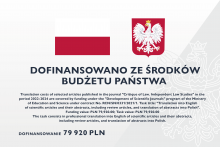Amit Yadav; Anita Yadav; Asha Rani Rawat; Preeti Sanger
2025
17
( 2 )
DOI: 10.7206/kp.2080-1084.775
Abstrakt
The authors explore the prospects of Indian legal education under the National Educational Policy (NEP) 2020, a sweeping plan to modernise the country’s education system. The NEP 2020 prioritises students’ all-around growth, interdisciplinary education, and 21st-century skill acquisition through a customisable programme. The article highlights various aspects of India’s legal education system that are affected by the NEP 2020, such as interdisciplinary learning, curriculum flexibility, real-world experience, and technological advancements. The NEP 2020 is expected to have a profound impact on the education in law in India, with the potential to revolutionise the country’s legal education system.
Maciej Perkowski; Wojciech Zoń; Izabela Kraśnicka; Wioleta Hryniewicka-Filipkowska; Małgorzata Skórzewska-Amberg; Ewa M. Kwiatkowska; Katarzyna Staszyńska; Maciej Oksztulski
2025
17
( 1 )
DOI: 10.7206/kp.2080-1084.764
Abstrakt
This article analyses the impact of legal research on the education of future lawyers in Poland, focusing in particular on legal regulations and educational practices. The study aims to explain how the findings of research projects, especially of those funded by the National Science Centre (NSC)10, can be applied in teaching. The authors hypothesise that basic research has a minimal effect on legal education, which may result from the applicable legislation and internal conditions within university. The research involved an analysis of legal documents, a literature review, as well as surveys and interviews with academic staff. It examined the relationship between research and teaching activities in the context of higher education reform. The findings indicate that while most academics perceive their teaching and research as synergistic, there exist barriers in this areas – such as low motivation for research among students. The authors emphasise the need for reforms to better integrate research with teaching, which is crucial for enhancing the quality of legal education.
Prayudi Rahmatullah; Basthomi Tri Kurnia Wang
2024
16
( 1 )
DOI: 10.7206/kp.2080-1084.663
Abstrakt
The community continues to be disturbed when strobe lights and sirens are abused. While sirens are used by private vehicles, they cause other drivers to automatically move aside to give way to the oncoming vehicle, strobes or light beams cause other drivers to feel blinded. This study employs a sociological method of empirical legal research. This study aims to examine how law enforcement uses Siyasah Dusturiyah and Law No. 22 of 2009 to target the usage of strobes and sirens on private vehicles. Law enforcement has taken steps to enforce the law on the use of strobes and sirens, including outreach with vehicle communities, based on the findings of the research. In line with Islamic teachings, the community and students have taken into consideration various aspects, particularly when viewed through the lens of Siyasah Dusturiyah. These include highlighting the advantages of promoting legal compliance and awareness as well as enhancing traffic safety and comfort.
Paweł Smoleń; Marzena Świstak
2022
14
( 3 )
DOI: 10.7206/kp.2080-1084.545
Abstrakt
The Polish Personal Income Tax Law provides for a relatively extensive group of tax exemptions related to various benefits offered to doctoral students and academics. It also includes an exemption for scholarships and assistance grants referred to in Law 2.0, as well as scholarships received under programmes or projects aimed at implementing the current state scientific policy. The rule adopted is that the exemption applies as long as the rules for granting the scholarships and grants in question them have been approved by the minister in charge of higher education and science. The research objective adopted in the gloss is to verify the jurisprudential practice regarding the issue of the tax exemption in question. The analysis and evaluation have been performed also in the context of the guidelines and ideas behind the reform of higher education and science (regulations of the so-called Law 2.0). This gloss is a critical commentary. It makes use of dogmatic-legal and normative analysis.
Anna Juzaszek; Maciej Juzaszek; Jan Bazyli Klakla
2021
13
( 2 )
DOI: 10.7206/kp.2080-1084.449
Abstrakt
In the paper, we deal with the issue of education of lawyers in doctoral schools in
Wyświetleń 3272
Pobrań 1133
Tynkiewicz Katarzyna
2014
6
( 1 )
DOI: 10.7206/kp.2080-1084.48
Abstrakt
The article is a polemic between Leo Tolstoy, a Russian writer and a moralist of the nineteenth century, and Leon Petrażycki, a Polish lawyer and a philosopher of law of that period – on the social significance of law and morality. Tolstoy’s and Petrażycki’s roads crossed due to a young man named Krutik, a law student at the University of St. Petersburg. Krutik wrote a letter to Tolstoy, whom he considered a moral authority, asking to dispel his doubts caused by reading the works of Petrażycki. Indeed, Tolstoy affirmed
Filip Rakoczy
2016
8
( 3 )
DOI: 10.7206/kp.2080-1084.122
Abstrakt
In my paper I would like to analyze the topic o academic legal education, using for that purpose tool granted by Rochard Rorty’s neopragmatism and Artur Kozak’s juriscentrism. In this article I consider the possibility of describing higher education and legal culture using both of those concepts, and to form some proposals for future shaping of this proces. In my text I aim to prove, tha contemporary legal education is basem mostly on the mechanisms of socialisation and professional training, which base rather on transfer of rules of legal reasoning and discussion within legal community, than on transfer of actual skills. Therefore I consider to which extent this process should be suplemented by methods which individualise students, and which allow the autocreation, which is, according to Rorty, should be the mian task of higher education. In the further parts of my paper I consuder, how those mechanisms will impact shaping of future lawyers, and by that, the legal community itself, and what benefits could we achieve this way.
Wyświetleń 3641
Pobrań 1155
Marta Chmura
2016
8
( 3 )
DOI: 10.7206/kp.2080-1084.116
Abstrakt
The publication aims is to remind Jerzy Wroblewski’s views on the issues related to legal education. After analyzing Wróblewski’s writings, the author compared a survey conducted among law students in 1958 (“Students’ assessments of the difficulties of the first year in legal studies”) with a poll conducted by herself in 2011. Both survey forms contained the same questions. The author wishes to underline the particular importance of observations and doubts of prof. Wroblewski, which despite the passage of time remains equally relevant today.
Wyświetleń 3496
Pobrań 1495
Piotr Mysiak
2020
12
( 4 )
DOI: 10.7206/kp.2080-1084.419
Abstrakt
The objective of this article is to present a new approach to legal education, which laid the foundations of the law curriculum at the Faculty of Law and Administration at the University of Zielona Góra. The concepts of legal education in Polish literature are presented in the first section of the article. The second part presents doubts connected to the prevailing model of teaching law at Polish universities – general studies (theoretical education). The next section presents the concept of teaching law at the Faculty of Law and Administration at the University of Zielona Góra, based on the concept of practical studies. There are presented solutions to improve the practical education and professional prospects of students. The implementation of this concept is provided in the fourth section. There are presented effects of certain solutions (presented in the third section) after the end of the first cycle of law studies at the Faculty of Law and Administration at the University of Zielona Góra.
Wyświetleń 3599
Pobrań 1082
Katarzyna Górak-Sosnowska; Ewa Wiśniewska
2019
11
( 4 )
DOI: 10.7206/kp.2080-1084.342
Abstrakt
In 2018 Student Services Employee Association (Stowarzyszenie Forum Dzieka na-tów) was established. One of its aims is to get involved in a dialogue with organisations and institutions dealing with higher education, in particular with the Ministry of Science and Higher Education as the relevant public authority. In this regard the Association proposed three amendments to the Act of Higher Education and Science in terms of administrative procedure, in particular: notice on initiation of procedure, simplified procedure and silent settlement of case, which were sub-mitted to the Ministry. As a bottomup initiative of student services employees at HEIs, it enables them to get involved in consulting acts on higher education and proposing amendments to these regulations. This role of the Association is significant due to the fact that in many HEIs student services employees have no ability to provide feedback on the regulations that they are executing.
Łukasz Kierznowski
2020
12
( 2 )
DOI: 10.7206/kp.2080-1084.386
Abstrakt
The purpose of the article is to indicate the selected potential and desired consequences of establishing doctoral schools to educate doctoral students in the field of legal sciences, with a special consideration of the interdisciplinary nature of such schools. The paper addresses the Polish legal framework. The article proposes a thesis that doctoral schools have a chance to benefit the education of future doctors of law, especially thanks to their interdisciplinary nature, which involves
Wyświetleń 2847
Pobrań 2205
Jolanta Jabłońska-Bonca
2018
10
( 2 )
DOI: 10.7206/kp.2080-1084.211
Abstrakt
Current legal studies curricula in Poland are still “analogue”, academic teachers themselves are still largely “analogue”, and students and articling students live in a different world: they are “digital natives”, in other words, “homo zappiens”, meaning “constantly clicking”. On the other hand, curricula and programmes are saturated almost exclusively with legal doctrines, but the market needs law graduates in economy, also with the knowledge of market, business and enterprise opinion principles, including special soft skills, completely different from those required for centuries in courts. The author presents arguments for the necessary reform of legal studies in connection with the above phenomena.






